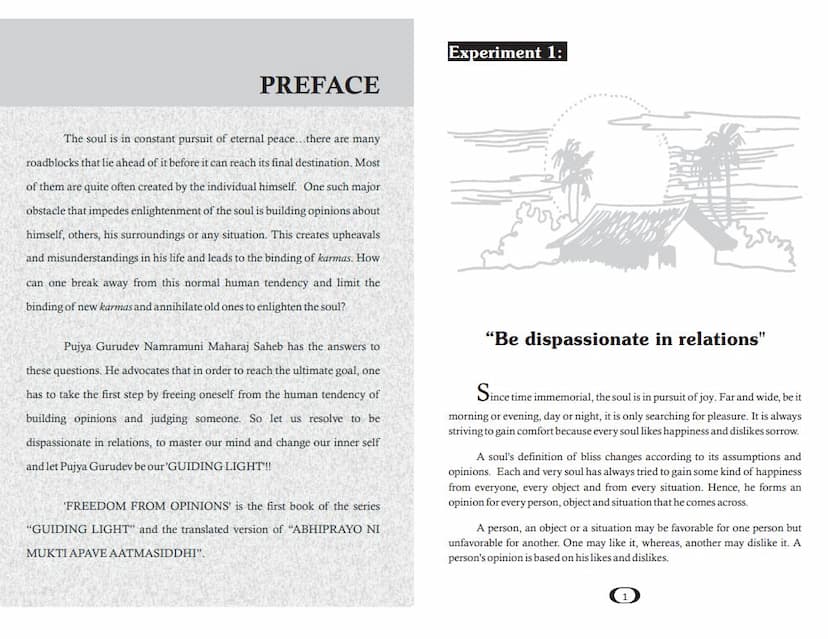Guiding Light Freedom From Opinion
Added to library: September 1, 2025

Summary
Here's a comprehensive summary of the provided Jain text, "Guiding Light: Freedom from Opinion" by Namramuni:
The book "Guiding Light: Freedom from Opinion," the first in a series, focuses on a core principle within Jainism: the liberation from the tendency to form and express opinions. This tendency, the author argues, is a significant impediment to spiritual progress and the enlightenment of the soul.
The Problem of Opinions:
- Hindrance to the Soul's Pursuit of Peace: The soul is eternally seeking peace and happiness, but the formation of opinions about oneself, others, situations, or objects creates "roadblocks." These opinions lead to inner turmoil, misunderstandings, and the binding of karmas.
- Rooted in Likes and Dislikes: Opinions are fundamentally based on an individual's likes, dislikes, and assumptions. What is favorable for one person may be unfavorable for another, leading to subjective and often incomplete judgments.
- Formation of Fixed Impressions: Once an opinion is formed, it tends to solidify in the mind, creating "knots of assumptions" that are difficult to untie. Situations may change, but ingrained opinions often persist.
- Influence of the Environment: In the current era, people are easily influenced by their surroundings, absorbing external perceptions without critical evaluation, even if they contradict their values.
- Binding of Karmas: The text emphasizes that karmas are not bound simply by observing, but by expressing an opinion about a person, object, or situation.
- Obstinacy and Conflict: Staunchness in one's opinions can lead to obstinacy, which is considered irreligion and the root cause of conflicts and clashes.
The Ideal State: Vitraagadasha (Dispassion):
- Being Like a Mirror: The ideal state, as advocated by Jainism, is Vitraagadasha, a state free from opinions, attachments, and passions. This is likened to a mirror that reflects whatever is before it without judgment, involvement, or change. A true observer or "accomplice" in this context acts like a mirror, observing without reacting or forming opinions.
- Focus on Inner Growth: Spiritual progress requires inner growth, not just superficial physical austerities.
The Solution: Freedom from Opinions:
The book proposes a multi-faceted approach to achieve freedom from opinions:
-
Become Like a Mirror:
- Observe everything without getting involved or expressing opinions.
- Remain unaffected by changing situations.
-
Understand the Impermanence of the World:
- Recognize that the world and everything in it are constantly changing. Present observations are momentary and may not reflect the complete truth or future states.
- Avoid forming permanent opinions based on fleeting circumstances.
-
Reduce Expression of Opinions and Advice:
- The book strongly advises against expressing opinions, especially when unsolicited. This is termed "exemption from speech," meaning speaking only as much as is necessary.
- Giving advice is also discouraged unless specifically asked for.
- Interfering in others' lives and forming opinions about them should cease.
-
Master Your Mind:
- The mind is identified as the most active faculty and the root cause of being opinionated.
- Controlling the mind is crucial for spiritual progress. A mind that cannot be controlled will lead to constant expression of opinions and wandering in the world.
- The mind is capable of changing any situation, but it must be mastered.
-
Self-Reflection and Introspection:
- Before forming opinions about others, one must first try to understand oneself and one's own inner self.
- Recognize that you never know anyone completely (100 percent).
-
Confess and Erase Past Memories:
- Opinions are formed from accumulated past memories and beliefs. These must be broken and erased for sadhana (spiritual practice) to be successful.
- Confessing past mistakes and sins to a Guru is essential for purifying the soul.
-
Practical Experiments and Resolutions:
- Experiment 1: Resolve to be dispassionate in relations, master the mind, and change the inner self. Pledge, "I will not interfere in anyone's life."
- Experiment 2: Reduce contact with people, making the circle of relationships smaller. Make a conjecture: "I will not express my opinion to anyone."
- Experiment 3: Change one's nature by resolving, "I will change my nature and stop interfering in others' lives."
- Key Resolution: "I want to stop forming opinions. I will not have feelings of like or dislike for anyone and will not have any preconceived notions for any person or object. Everything is acceptable to me as it is, how it is, and where it is."
- Avoid telephone calls unless necessary, as they often lead to trivial conversations about others, binding karmas.
- Do not give importance to others' opinions, whether praise or criticism, as they are often incomplete and biased.
Consequences of Opinions and Freedom:
- Happiness and Sorrow: Opinions can lead to both happiness and sorrow, and they can either bind or annihilate karmas based on the underlying feelings.
- Liberation: One who stops opining and becomes dispassionate purifies their soul and can progress on the path of liberation.
- Reduced Karma: By reducing opinions and interference, one's karma binding will reduce, leading to less sin and greater peace.
- The Power of Thought: The book highlights that thoughts, even good ones, can have immense power. One good thought can lead to liberation, while one bad opinion can lead to hell.
- True Knowledge: True knowledge and faith are attained when one controls the mind, repents for negative thoughts, and accepts mistakes humbly.
In essence, "Guiding Light: Freedom from Opinion" teaches that the constant judgment and expression of opinions are self-imposed limitations that hinder spiritual growth. By cultivating a dispassionate, observant nature, mastering the mind, and focusing on self-improvement rather than external judgments, individuals can pave the way for inner peace and ultimate liberation.